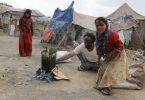The British Red Cross works with our partners, the Yemen Red Crescent Society and German Red Cross, to provide a wide range of reproductive and other health services at the clinic. These include support for safe childbirth, emergency caesarean sections and care for premature or low-birth-weight babies.
Michael Van Koesveld, Yemen country manager for the British Red Cross, said: “This health centre provides the only health services women during pregnancy and birth in the city of Hajja in northern Yemen.
“Unfortunately, government and other health services in this area – even those provided by other international charities – have been forced to close as a result of of Yemen’s serious conflict.
“At the same time, the population has increased because people have fled to Hajja to escape the fighting.
“All clinic services are provided free of charge, including emergency procedures, and it serves any mothers or babies who need medical care.”
The number of patients using the maternal health services has increased steadily from 342 in May to 532 in August.
Malnutrition is a huge problem
The conflict has caused food shortages in most of Yemen. Serious floods in Hajja in April, then again in July and August, destroyed both crops and homes. This, as well as the large influx of people, made the situation even worse.
Malnutrition among pregnant women is now a serious issue. The clinic regularly treats mothers with medical problems caused by malnutrition including anaemia, obstructed labour and postpartum haemorrhage. Their babies may also be premature or have a low birth weight.
Nutritious food is available in a feeding clinic attached to the health centre. The priority now is saving lives and then when security allows, the Red Cross and our Red Crescent partners will look at other ways to increase the amount of food available.
Infectious diseases treated
Waterborne and other infectious diseases are also significant problems in Hajja. The clinic has treated over 300 people with diarrhoea, which is often caused by dirty water and can kill children quickly in a hot climate.
This indicates the shortage of clean water and hygienic sanitation in the area, caused at least in part by the conflict. The Red Cross is now assessing water availability and will use findings to improve family hygiene.
In addition, in the past four months the clinic has treated cases of measles and whooping cough, which are easily preventable through vaccination.
“Over 600 hospitals and health centres in Yemen have been forced to close because of the fighting. This has disrupted normal preventive and emergency health services, and reflects a disregard of international humanitarian law,” Michael Van Koesveld said.
“The Yemen Red Crescent Society clinic in Hajja is providing a vital service to families with nowhere else to go for their health care.”
Original Article







